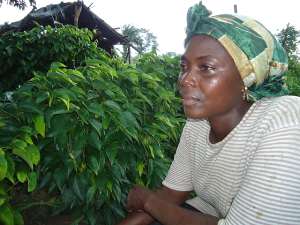
The Root and Tuber Improvement and Marketing Programme (RTIMP) has reached over 100 thousand farmers with improved varieties of root and tuber crops, since the second phase of the project began in 2007.
The Programme is expected to exceed the 180,000 farmers targeted to receive improved varieties of cassava, sweet potato, cocoyam and yam.
The 8-year RTIMP is funded by the International Fund for Agricultural Development (IFAD) and the Ghana government with the goal to increase food production and enhance the income levels of the rural poor.
Some 750,000 farmers, mainly cassava farmers, were reached in the first phase of the project between 1999 -2005.
Angela Osei-Sarfoh, Production Specialist, says there was inadequate healthy planting materials and lack of techniques in seed multiplication for yam before RTIMP.
Before the inception of the programme, yam farmers, for instance paid a lot of money for seed yam and this could take about 50 percent of production cost.
Now, over 85 districts in Ghana are engaged in planting material multiplication and distribution – secondary multiplication involves contracted farmers for further multiplication and distribution to more farmers.
Afia Achiaa has been producing yam for the past eight years in the Sekyere district. She acknowledged the farmers were initially skeptical about the small size of the new seed yam compared to the bigger ones they were used to.
They however accepted the improved varieties after they were taken through the participatory Farmer Field Fora (FFF) technique, a researcher-extension-farmer interactive activity, which is the main strategy the RTIMP is using to facilitate technology adoption by farmers.
Afia is excited the FFF has proved to be highly beneficial. Two years ago, she invested Gh¢5,500 to cultivate his farm, using the old planting materials. After harvest, she realized only Gh¢800 from her toil.
Her fortunes however turned round when she joined the FFF and adopted the RTIMP planting technique.
“When I followed their technique, I spent Gh¢2,500 to buy the seed, prepare my bed and other things. At the end of it all, I've earned over ¢6,000 and if I'm to sell the seeds I'm planning to replant, I can make an additional Gh¢10,000”, said Afia, who has managed to send two of her children to senior high school and has started building her house through her farming business.
The rapid multiplication technique ensured yam farmers can crop twice annually, instead of the usual once a year.
Mrs. Osei-Sarfoh observed “the seed is very expensive so if farmers acquire the skill and the knowledge in multiplying, then that means they don't have to go and buy the seed which is expensive and can be scarce. So we've equipped them to the extent that they'll be able to produce their own seed.
“With this on an acre of land, you get more seed at the end. So the farmers have really realized that they can make more money; apart from feeding the family, they can also produce their own seed and even sell some of the seed to make more money to support the family”.
Farmers, under RTIMP, have not only been trained in seed multiplication techniques but also supported with seed storage structures to ensure sustainability of their ventures.
Story by Kofi Adu Domfeh




 Dumsor: Don't rush to demand timetable; the problem may be temporary — Atik Moha...
Dumsor: Don't rush to demand timetable; the problem may be temporary — Atik Moha...
 Space X Starlink’s satellite broadband approved in Ghana — NCA
Space X Starlink’s satellite broadband approved in Ghana — NCA
 2024 election will be decided on the grounds of the economy; choice of running m...
2024 election will be decided on the grounds of the economy; choice of running m...
 Dumsor: We're demanding less; just give us a timetable — Kwesi Pratt to ECG
Dumsor: We're demanding less; just give us a timetable — Kwesi Pratt to ECG
 Do I have to apologise for doing my security work, I won’t – Simon Osei-Mensah r...
Do I have to apologise for doing my security work, I won’t – Simon Osei-Mensah r...
 All my businesses have collapsed under Akufo-Addo — NDC Central regional chair
All my businesses have collapsed under Akufo-Addo — NDC Central regional chair
 Military, Prison Officers clash in Bawku, three injured
Military, Prison Officers clash in Bawku, three injured
 GRA-SML contract: MFWA files RTI request demanding KPMG report
GRA-SML contract: MFWA files RTI request demanding KPMG report
 Court threatens to call second accused to testify if NDC's Ofosu Ampofo fails to...
Court threatens to call second accused to testify if NDC's Ofosu Ampofo fails to...
 Family accuses hospital of medical negligence, extortion in death of 17-year-old...
Family accuses hospital of medical negligence, extortion in death of 17-year-old...
